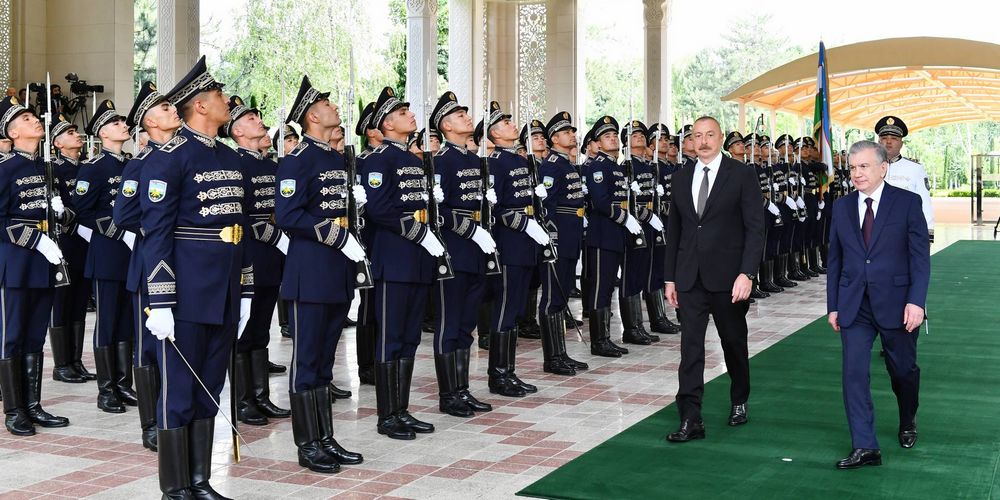Search

Publications
Ilham Aliyev’s visit to Uzbekistan: current relations, objectives and outlook

On 21-22 June 2022, the official visit of Ilham Aliyev, the President of Azerbaijan, to the Republic of Uzbekistan took place. The Azerbaijan leader visited Tashkent, Khiva, Urgench, and had negotiations with the President of Uzbekistan Shavkat Mirziyoyev and the Prime-Minister Abdullah Aripov.
Trade and economic ties
The main outcome of the visit was signing the Declaration about deepening the strategic partnership and ramping up the comprehensive cooperation between Uzbekistan and Azerbaijan. This a global document bringing the relations between the two countries up to a new level, Ilham Aliyev emphasized: «This is a road map for our future activities. It reflects the priorities of our foreign policy, our mutual support of territorial integrity, independence and sovereignty of our countries, as well as specific tasks and goals in various spheres».
The document covers about 40 areas of collaboration, such trade and economic partnership enhancement, industrial cooperation, efficient use of transportation and transit potential.
Definitely, the achieved agreements between Baku and Tashkent should be viewed in the context of the rapidly changes of global geopolitical situation, when the obvious globalization failure brings to life various regionalization projects, which are of high demand today. It is important to emphasize that neither Azerbaijan, nor Uzbekistan are members of any military blocks, so in the capacity of non-allied countries they can implement any kind of bilateral integration formats, including projects in the spheres of security and defense. Thanks to the efforts of the Presidents I. Aliyev and S. Mirziyoyev, the relations between the two countries are now the relations of allies.
Based on the statements the leaders of the two states voiced after signing the Declaration about deepening the strategic partnership and other documents pertaining to bilateral cooperation, Ilham Aliyev’s visit to Uzbekistan was thoroughly worked through – both from the economic standpoint, and in humanitarian and political aspects. In elaboration of this conclusion, we need to highlight that the press relations service of the President of Uzbekistan called the negotiations «very fruitful», and the Azerbaijan party also presented similar positive evaluation. [1]
In particular, in the sphere of trade and economic relations the parties agreed to set up a joint investment fund for development and promotion of high-potential projects of Azeri-Uzbek cooperation with a special focus on mechanic engineering and agrarian policy. On top of that, the Presidents discussed the possibility of mutual trade ramp-up and implementation of joint projects in the free economic zones to export products to third-parties’ markets. In this regard, the following ideas are of special interest: developing the road map for setting up a joint silk production cluster, promoting cotton farming projects, innovative developments implementation, and I. Aliyev and S. Mirziyoyev already issued the respective assignments to the core ministries.
18 documents were signed in the presence of the heads of the two states. They include regional cooperation agreements, agreements in the spheres of industry, international highway service, illegal migration control, plant quarantine and protection, military and military-technical cooperation, the program of cooperation in tourism.
We need to separately highlight the establishment of the specialized Working group headed by the ministers of transport from both countries with the objective to remove the barriers in the sphere of commodities trade and transit, as well as to improve the efficiency of the existing transport communications system.
The countries are also facing the task of assuring the unimpaired operation of the multimodal transportation corridor Uzbekistan – Turkmenistan (Turkmenbashi port) – the Caspian Sea – Azerbaijan (Alyat port) – BTK railroad (Baku – Tbilisi – Kars) – Turkey – Europe.
There are some other good prospects and opportunities, such as Trans-Afghan corridor, implementation of China – Kyrgyzstan route and the expected launch of Zangezur corridor.
This intent of Azerbaijan and Uzbekistan to develop transregional multimodal transportation corridors will allow not only for increasing the volumes of shipments, but also for both countries performing the roles of communicators between major economics (APR and EU countries), as well as for improving the transit potential of Central Asia and the South Caucasus in general.
Another fact deserving our attention is adopting the tourism development program and the decision to organize a joint tourist fair. In addition, the countries agreed to work on organizing the Forum of Uzbekistan and Azerbaijan Regions, and in case all the achieved agreements are implemented quickly, it may take place in Tashkent this August already.
In view of the above, it appears that the plans of collaboration between Uzbekistan and Azerbaijan in the spheres of economy, industrial cooperation and trade look quite realistic and are based on the results already achieved. According to their statistics agencies, over the recent years the bilateral trade turnover indicators and the number of joint ventures have grown drastically. In particular, there are 238 enterprises with Azerbaijan capital in Uzbekistan, and 53 Uzbek companies operate in Azerbaijan. As for the trade turnover, the indicators grew 7 times over the recent five years, and in 2021 the total turnover grew by 42%, during January – May 2022 – by 49%.
We need to acknowledge that in absolute monetary terms all these achievements look rather modest – USD 118.8 mln in total based on the previous year results. However, looking at the statistics numbers we need to remember that back in 2016 the trade between Uzbekistan and Azerbaijan made only USD 17.1 mln. The Uzbek export to Azerbaijan grew 5.8 times over the last five years – from USD 13.1 mln up to USD 75.9 mln, and the import from Azerbaijan to Uzbekistan grew 10 times – from USD 4 mln to USD 42.9 mln.
The value of culture, symbolism and the «Turkic world» ideology
At the same time, at the reception organized in honor of Ilham Aliyev in the city of Khiva, the President of Uzbekistan S. Mirziyoyev especially emphasized that despite the importance of cooperation in the political and economical spheres, the «key value» uniting the Uzbek and the Azeri nations is culture. «Not a single one of our intents or ideas may be implemented without culture and cultural ties», the Uzbek leader emphasized.
In this context, the ceremonial opening of Heydar Aliyev square in the Mirabad district of Tashkent with participation of the Presidents of both countries became an especially important event for Baku. [2] As Shavkat Mirziyoyev said in his speech dedicated to the leader of the Azeri nation, «he made it into history as a prominent politician and statesman of the 20th century, the architect of independent Azerbaijan. Due to his firm determination, strong political will and exclusive leadership qualities of Heydar Aliyev, the young sovereign state successfully overcame all the difficulties and hardships».
In his turn, Ilham Aliyev expressed his gratitude to the Uzbek leader: «I am extremely grateful to my dear brother Shavkat Miromonovich for his initiative to establish such a beautiful spot in Tashkent downtown dedicated to my father Heydar Aliyev. In this, we see the brotherly attitude of our Uzbek brothers to our great leader, to our common history. This is also a sign of respect to all the Azeri people».
We should remember that about 40 thousand of the Azerbaijani live in Uzbekistan. In 2003, the Association of the Azeri cultural centers was established. In 2010, the new building of the Azeri cultural center named after Heydar Aliyev was opened with the Azerbaijan embassy.
Ideology, symbolism and culture are the priority elements of the relations between Uzbekistan and Azerbaijan, the form the necessary basis and a favourable background for developing political, trade and economic cooperation.
In the context of analyzing the humanitarian ties between Tashkent and Baku it should be taken into account that both countries belong to the Turkic States Organization (used to bear the name of the Turkic Council until 2021) with the objective of not just coordinating the policy in foreign relations, security, trade and economic ties, but forming the civilization commonality of the Turkic World, where the Republic of Turkey reasonably plays the first fiddle.
Baku has been in the process of rapprochement with Ankara for quite some time implementing into practice the «one nation – two states» model. As for Uzbekistan, it officially joined the Turkic States Organization only in 2018, and this decision appears to be one of the elements of «the new deal» implemented by the President Shavkat Mirziyoyev.
In our opinion, the positions of Turkey in Central Asia will quite fairly grow stronger through strengthening the connections between Uzbekistan and Azerbaijan. This is in line with the officially declared Ankara’s foreign policy objectives and the stated ambitions of the Turkish President R.T. Erdogan, who is undoubtedly one of the most prominent political leaders of the modern world.
There is a certain risk for Uzbekistan in connection with this: it needs to achieve positive synchronization between its engagement with the Turkic World and the development of relations with its traditional partner the Russian Federation, as well as with China, the connections with which are of key importance for the economy of Uzbekistan.
On top of that, the representatives of the «collective West» (the UK, EU, USA) are actively pursuing their own objectives in the region and especially in Uzbekistan with its «openness policy»: they promote the so-called «universal democratic values» and participate in training of loyal political elites. So, it is important and complicated challenge for Tashkent to prevent competition between the global political actors in Uzbekistan. We need to remember that the historical practices of multi-vector foreign policy of various post-Soviet states cannot be called positive.
At the same time, the preliminary expert review with participation of not only governments, but think tanks as well, is a progressive trend in the relations between Azerbaijan and Uzbekistan. For example, before the visit of Ilham Aliyev to Tashkent, on June 17, a video conference took place with participation of the experts from the leading analytical centers of Uzbekistan and the Azerbaijani Foreign relations analytical center; the topic of the conference was «Bilateral cooperation outlook in the global instability context». [3]
In fact, the track of expert-based diplomacy was created parallel to the official communication channels between Uzbekistan and Azerbaijan allowing for preventive study of the bilateral relations problems, identifying points of growth, monitoring of the situation and of the progress, as well as for planning risk mitigation measures and proposing the respective decisions to the government agencies.
Overall, the outlook for the Azerbaijani-Uzbek cooperation development is pretty good, and intensification of high and medium-level contacts between Baku and Tashkent is expected in the near future. At the same time, it is extremely important, especially for Uzbekistan, to avoid potential lopsidedness in foreign policy and to maintain the balance of interests capturing the benefits from cooperation with different partners. In essence, the commitment of Uzbek policymakers to perform this task underpins the sustainability of the current governance model, the stability of the national long-term growth, including in the area of cooperating with Azerbaijan.
1. The visit of the President of Azerbaijan is finished. Website of the President of the Republic of Uzbekistan, 22.06.2022.
2. The President Aliyev’s visit to Uzbekistan: details. Sputnik Azerbaijan, 22.06.2022.
3. The potential of trade, economic and investment cooperation between Uzbekistan and Azerbaijan is far from being fully unlocked. Review.Uz, 17.06.2022.







